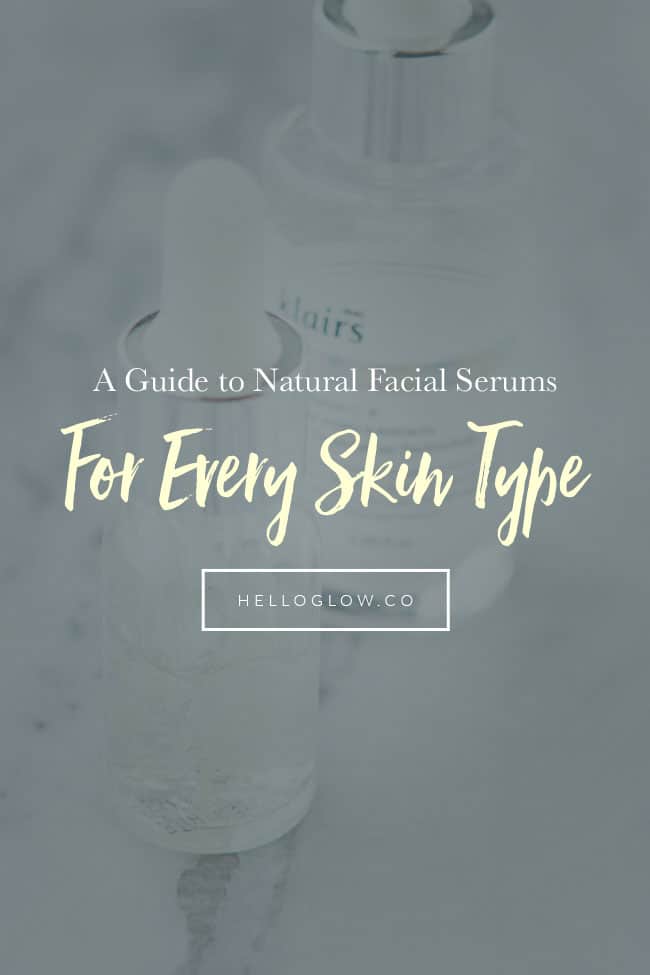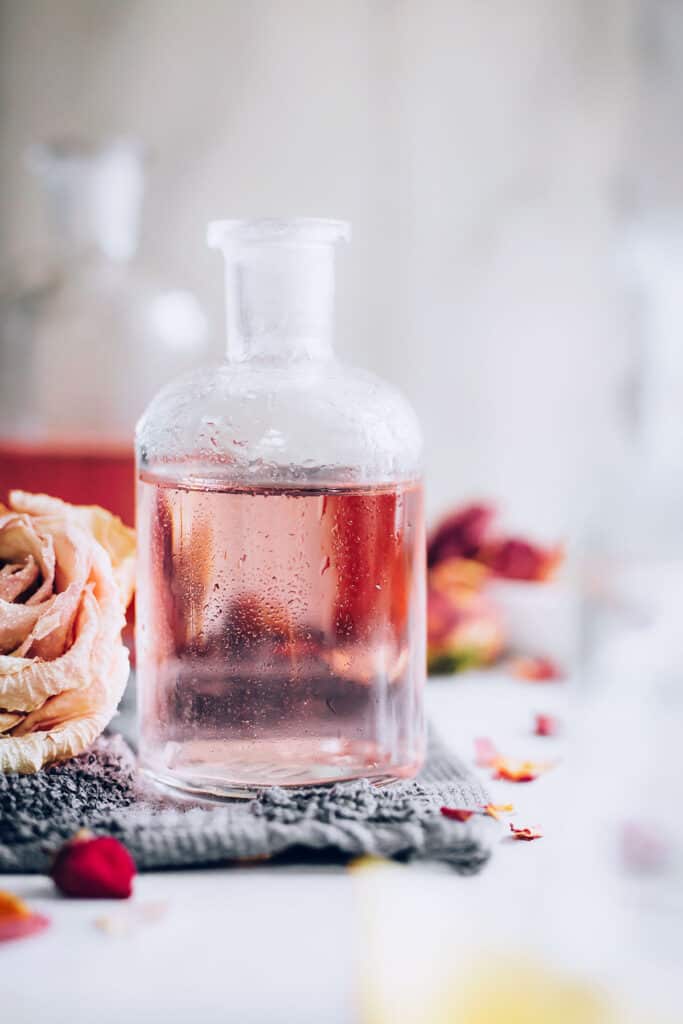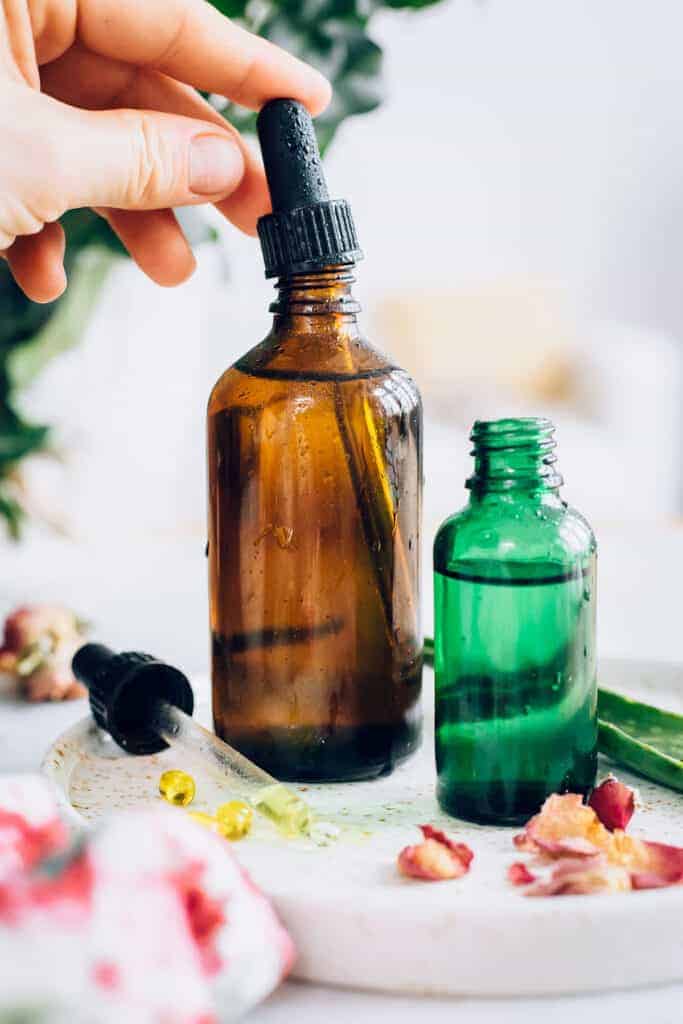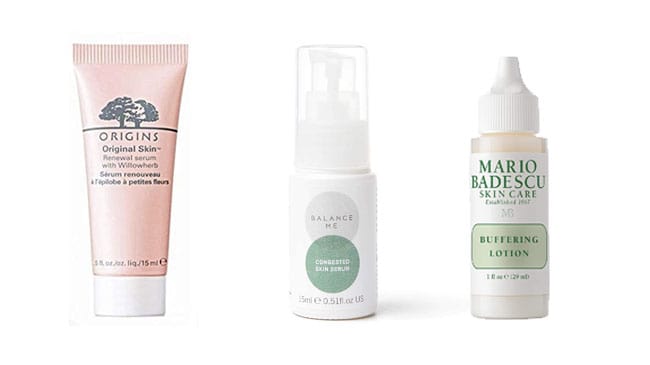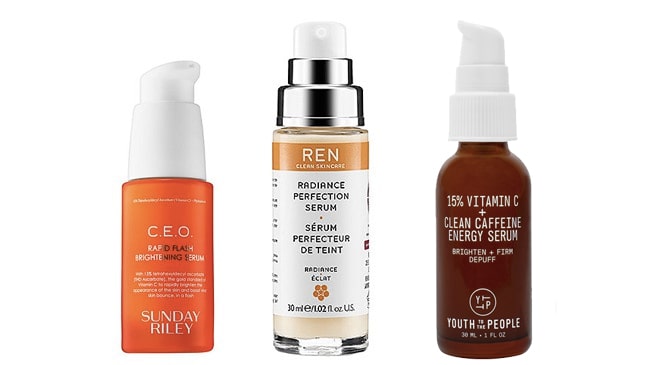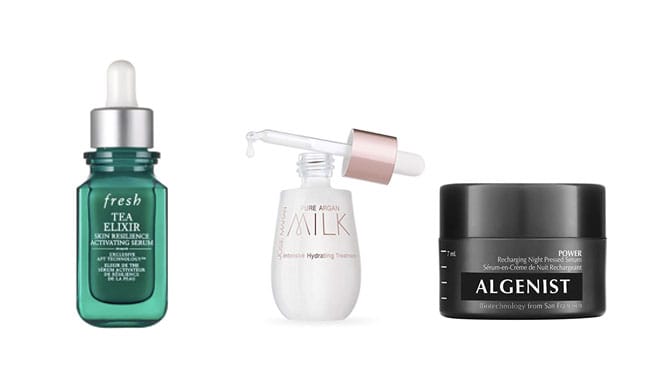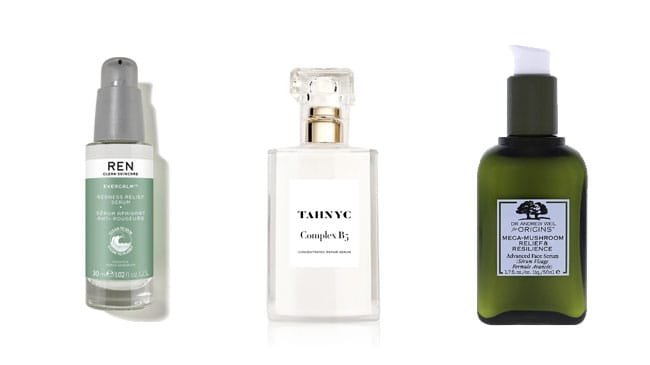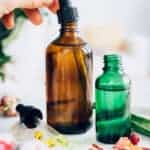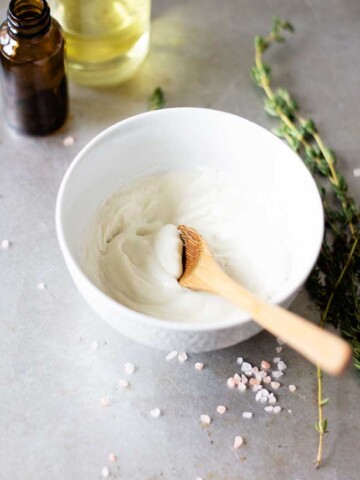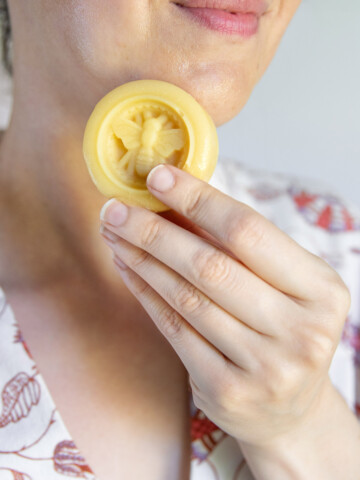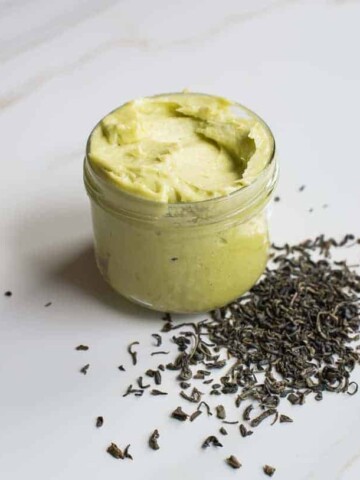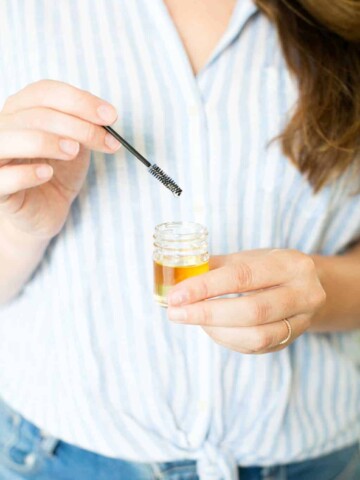As you get older, it seems like there's an ever-growing number of skin care products you have to use. In your teens, you cleansed (maybe); in your 20s, you might have added a good moisturizer to the mix; and then once reaching your 30s—oh boy!
Now you've got to start thinking about fine lines, but your T-zone is still oily, and all that sun exposure from the past three decades is starting to catch up with you.
We've got a great guide to the 5 essential components of any skincare routine to help you figure out exactly what you need for your skin type. But might I suggest the sixth step? A serum.
What is a serum?
Facial serums typically consist of an oil- or water-based treatment that delivers highly concentrated, targeted nutrients to address one or more skin problems. You can use one alone, two together, or different ones on specific parts of your face.
Serums should be used after cleansing but before moisturizing—although if you have oily skin, you can get away with using a serum as a stand-alone product.
How to Use a Serum
Good serums can be pricey, but since you only use 1–2 drops at a time, they'll last you quite a while. I apply serums twice a day after cleansing and toning. Here's how to do it:
Put a few drops in the palms of your hands and gently pat the serum onto your face until it's absorbed. Even rubbing it in a little won't cause wrinkles; skin needs stimulation to strengthen, and it doesn’t hurt elasticity. Once the serum is completely dry and absorbed, follow with your favorite moisturizer to seal in those active ingredients and let it work its magic.
General Guidelines
DIY face serums can be a great way to customize your skincare routine and address specific skin concerns. Depending on your skin's type and needs, you can create a serum that helps with acne-prone skin, sensitive skin, skin tone, aging skin, dryness, oiliness, fine lines and wrinkles, collagen production, texture, elasticity, troubled skin, and dark spots.
To create a natural face serum, start by choosing natural and organic ingredients, including essential fatty acids and plant and seed oils, to nourish and hydrate your skin. To address specific skin concerns, you can add ingredients such as hyaluronic acid, vitamin C, vitamin E, and ferulic acid to your serum.
If you are prone to breakouts, consider adding natural skin calmers like aloe vera or plant-based extracts to soothe inflammation and redness. If you have sensitive skin, choose gentle ingredients and avoid potential irritants. Vitamin C is an excellent addition for brightening skin tone and reducing the appearance of dark spots.
To make a hydrating serum, consider adding hyaluronic acid and essential oils that help the skin retain moisture. For aging skin, use ingredients that boost collagen production and improve elasticity. Fine lines can be addressed with natural ingredients that smooth wrinkles.
It's important to keep in mind that natural ingredients can also help protect the skin from free radical damage. Using a serum that nourishes and supports healthy skin will help keep it looking and feeling its best.
How to Make Your Own Natural Face Serum
If the hefty price tags of serums scare you, we have a tip for you: this might be a very good time to go the homemade route!
It's cost-effective, totally customizable for your skin, and as easy as mixing a few oils. Learn how to make a DIY face serum that tackles various skin issues, from acne to fine lines and everything in between.
Homemade serums typically combine face oil with other common skincare ingredients like aloe vera, glycerin, and rosewater. We'll walk through the benefits of each.
First, pick the right face oil.
Think about your face type. Is your skin oily or dry? Are you battling acne or redness? This guide can help you pick the right face oil for your skin type.
Oily skin
-Grapeseed oil
-Tamanu oil
-Apricot kernel oil
To address acne, you need a serum that can penetrate congested pores and soothe inflamed skin. This face serum for acne uses jojoba, hemp seed, or grapeseed oil, three oils that are ideal for acne-prone skin, even when you have a breakout.
Dry/Aging skin
-Rosehip seed oil
-Sweet almond oil
-Avocado oil
If your skin is dry, opt for a more decadent oil like rosehip, avocado, or sweet almond. This anti-aging face serum uses rosehip oil, one that can soothe inflammation, fight age spots, and stimulate collagen production [source].
You can also combine rosehip with another rich oil like pumpkin seed if you're looking for a repair serum to hydrate scars or address discoloration. Keep any product with rosehip oil in the fridge to increase its lifespan, and treat yourself to a refreshing serum every day.
Normal/Combination skin
Jojoba and sunflower seed oils work well for most skin types. They'll hydrate any skin type without feeling heavy.
Then add other liquid ingredients.
Aloe vera
Aloe vera helps kill acne-causing bacteria, heal scars, and lighten blemishes. Plus, it provides a major hydration boost and has been shown to reduce wrinkles [source]. Start the day with this homemade face serum made with aloe vera gel, jojoba oil, and frankincense essential oil as a base for makeup.
Glycerin
If you want to skip oil altogether, you can combine glycerin, a natural humectant, with aloe vera. Your face will feel soft and pampered but not unpleasantly greasy.
Rosewater
Anti-inflammatory, hydrating, and calming, rosewater provides tons of skin benefits. It works for all skin types with its astringent and antibacterial properties [source]. As it is stored, the rosewater will separate from the oils, so give the bottle a shake to combine each time before using.
And then consider a few special additions.
Vitamin C
Vitamin C helps repair the underlying layers of skin by stimulating collagen production, which helps prevent fine lines and wrinkles from forming. A vitamin C serum can also lighten age spots and even out discoloration [source].
You can make a vitamin C serum with a powder made from the vitamin, like L-ascorbic acid or ascorbic acid powder, or you can use a powder from camu camu, the plant with the highest level of naturally occurring vitamin C [source] if you don't mind a grittier texture.
Start small because these ingredients degrade quickly and lose their potency every time they are exposed to oxygen and light.
Essential oils
These concentrated botanical extracts can be beneficial for all skin types, helping to soothe inflammation, balance oil production, and hydrate skin. This guide to the best essential oils for your skin will help you find an oil that suits your skin type.
But remember, essential oils pack a potent punch and cannot be applied directly on the skin. They need to be diluted in a carrier oil first. Facial products that you'll be using every day typically need a 1% dilution. That means 4–6 drops of essential oil per tablespoon of carrier oil.
Try Roman chamomile essential oil to calm irritated skin. Lavender, tea tree, and frankincense essential oils effectively diminish acne and scarring.
Basic Homemade Natural Face Serum Recipe
Facial skincare recipes typically use a 1% dilution of essential oil, which is 6–9 drops of essential oil per ounce (2 tablespoons) of carrier oil.
—1 tablespoon carrier oil
—1 tablespoon another carrier oil or another liquid ingredient
—6–9 drops essential oil
Instructions
Use a funnel to pour the ingredients into a small bottle with a dropper lid.
Shake well before each use and apply to a clean, damp face.
7 Facial Serum Formulations
1. Scarring/discoloration
—1 tablespoon rosehip oil
—1 tablespoon pumpkin seed oil
—6–9 drops frankincense essential oil
2. Sensitive skin
—1 tablespoon evening primrose oil
—1 tablespoon jojoba oil
—6–9 drops chamomile essential oil
3. Aging/Mature skin
—1 tablespoon pomegranate seed oil
—1 tablespoon jojoba oil
—6–9 drops clary sage essential oil
4. Dry skin
—1 tablespoon argan oil
—1 tablespoon sweet almond oil
—6–9 drops geranium essential oil
5. Acne-prone skin
—1 tablespoon tamanu oil
—1 tablespoon hemp seed oil
—6–9 drops tea tree essential oil
6. Oily skin
—1 tablespoon jojoba oil
—1 tablespoon grapeseed oil
—6–9 drops neroli essential oil
7. Sagging skin
—1 tablespoon jojoba oil
—1 tablespoon argan oil
—6-9 drops coffee essential oil
Not ready to DIY? Here's a list of our favorite natural face serum picks:
Every skin type can benefit from the addition of a serum. But because they're so concentrated, it's essential to make sure you're using one that's made for your skin type so you don't exacerbate any skin issues you might have. Here are some of our favorite facial serums for every skin type:
Serums for Oily Skin
Origins Original Skin Renewal Serum // Combat dullness, rough patches, and large pores with this restorative serum.
Balance Me Congested Skin Serum // This natural serum calms inflammation and speeds away blemishes and breakouts without dryness or irritation.
Mario Badescu Buffering Lotion // This on-the-spot solution is designed to help shrink large, under-the-surface bumps typical of combination and oily skin.
Serums for Normal or Combination Skin
Sunday Riley CEO Rapid Flash Brightening Serum // Vitamin C is a great ingredient to add to your skin routine—it’ll make your skin radiant and improve its tone.
REN Radiance Perfection Serum // Helping to brighten and correct skin tone, this serum works for every skin type.
Youth to the People Vitamin C + Clean Caffeine Energy Serum // You might not be seeing signs of aging yet, and this firming serum will help keep it that way!
Serums for Dry or Aging Skin
Tea Elixir Skin Resilience Activating Serum // Boost skin’s visible resilience to everyday life stressors for a smoother texture, visible glow, restored bounce, and reduced look of wrinkles.
Josie Maran Pure Argan Milk Intensive Hydrating Treatment // Microdroplets of argan oil penetrate the skin quickly and deeply to moisturize even the driest skin while also fighting signs of aging.
Algenist POWER Recharging Night Pressed Serum // When your skin needs some serious TLC, this bedtime serum will refresh in as little as 10 days.
Serums for Sensitive Skin
REN Evercalm Redness-Relief Serum // If you’re embarrassed by constant facial redness, this gentle serum will help keep irritation and inflammation at bay, all while moisturizing and improving skin tone.
Tahnyc Complex B Concentrated Vitamin B5 Serum // Stressed out skin? Vitamin B5 and peptides combine to heal and calm redness and irritation.
Dr. Andrew Weil for Origins Mega-Mushroom Skin Relief Advanced Face Serum // Mushrooms are one of our favorite superfoods—and they can soothe sensitive skin too!
Basic Homemade Natural Face Serum Recipe
Materials
- 1 tablespoon carrier oil
- 1 tablespoon another carrier oil (or other liquid ingredient)
- 6–9 drops essential oil of your choice
Instructions
- Use a funnel to pour the ingredients into a small bottle with a dropper lid.
- Shake well before each use and apply to a clean, damp face.
Notes
- 1 tablespoon rosehip oil
- 1 tablespoon pumpkin seed oil
- 6–9 drops frankincense essential oil
- 1 tablespoon evening primrose oil
- 1 tablespoon jojoba oil
- 6–9 drops chamomile essential oil
- 1 tablespoon pomegranate seed oil
- 1 tablespoon jojoba oil
- 6–9 drops clary sage essential oil
- 1 tablespoon argan oil
- 1 tablespoon sweet almond oil
- 6–9 drops geranium essential oil
- 1 tablespoon tamanu oil
- 1 tablespoon hemp seed oil
- 6–9 drops tea tree essential oil
- 1 tablespoon jojoba oil
- 1 tablespoon grapeseed oil
- 6–9 drops neroli essential oil
References (in order of appearance):
1. Mármol I, et al. Therapeutic applications of rose hips from different Rosa species. Int J Mol Sci. 2017.
2. Tanaka M, et al. Effects of plant sterols derived from Aloe vera gel on human dermal fibroblasts in vitro and on skin condition in Japanese women. Clin Cosmet Investig Dermatol. 2015.
3. Mahboubi M. Rosa damascena as holy ancient herb with novel applications. J Tradit Complement Med. 2016.
4. Pullar JM, et al. The roles of vitamin C in skin health. Nutrients. 2017.
5. Langley PC, et al. Antioxidant and associated capacities of Camu Camu (Myrciaria dubia): a systematic review. J Altern Complement Med. 2015.
This post was medically reviewed by Dr. Jennifer Haley, a board-certified dermatologist with extensive experience in medical, cosmetic, and surgical dermatology. Learn more about Hello Glow’s medical reviewers here. As always, this is not personal medical advice, and we recommend that you talk with your doctor.
535
